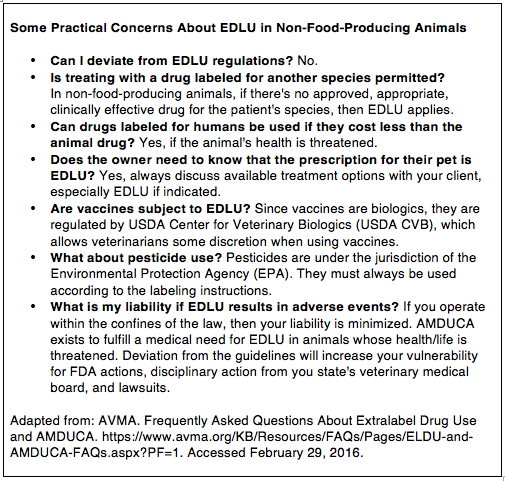Drug development for veterinary medicine is a tiny fraction of that for human medicine because species-specific drug development offers little return on investment for pharmaceutical companies. As such, there are relatively few numbers of drugs that are approved for a particular animal species. Therefore, veterinarians often rely on using drugs that are not intended for the species being treated (usually human drugs in animal species).
However, extra-label (or "off-label") drug use in animals isn't pure guesswork, but rather, an extrapolation because drug-development for humans first begins with animal testing for efficacy and safety. Hence, it's not unreasonable to consider using approved, well-established human drugs in animals, or even animal drugs approved for use in other unrelated species.
Notably, a Canadian study of electronic records (published in JAMA Intern Med, January 2016) recently reported that off-label use of prescription drugs in humans is associated with a higher incidence of adverse drug events than on-label use (19.7 per 10 000 person-months vs 12.5 per 10 000 person-months, respectively); this incidence is even higher in off-label use lacking strong scientific evidence (21.7 per 10 000 person-months).
Extra-label drug use (ELDU) is regulated by the US FDA through the Animal Medicinal Drug Use Clarification Act of 1994 (AMDUCA). The Act allows veterinarians to use approved drugs extra label to treat animals whose health is threatened, are suffering, or will die as the result of failure to medicinally treat. It requires that the ELDU of an approved animal or human drug must be administered by or on the order of a licensed veterinarian within the context of a veterinarian-client-patient relationship (VCPR). It's important to remember that minor differences in the formulation of human drugs can alter their pharmacokinetics and pharmacodynamics when used in animals.
AMDUCA essentially made ELDU legal in the US—if drug use does not pose a public safety risk—and the regulations apply to all animal species. The FDA Center for Veterinary Medicine is responsible for the regulation and enforcement of ELDU. (Animals used as food sources are subject to more extensive regulations because of a greater risk to public safety but these are not discussed here.)
In practice, the veterinarian should follow specific criteria and guidelines when considering ELDU in companion animals:


For more information on AMDUCA, the full text can be found on the FDA website, and FAQs are available on the AVMA website.
Sources:
American Veterinary Medical Association (AVMA). Extralabel drug use and AMDUCA: FAQ. Accessed March 1, 2016.
Eguale T, Buckeridge DL, Verma A, et al. Association of off-label drug use and adverse drug events in an adult population. MA Intern Med. 2016;176(1):55-63.
Rollin BE. An ethicist's commentary on extra-label drug use. Can Vet J. 2002;43(10):749-750.
US Food and Drug Administration. Animal Medicinal Drug Use Clarification Act of 1994 (AMDUCA). Accessed March 3, 2016.